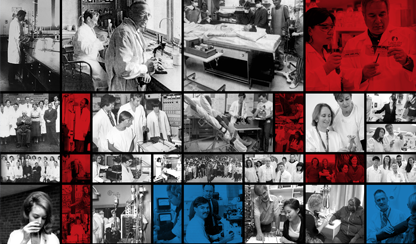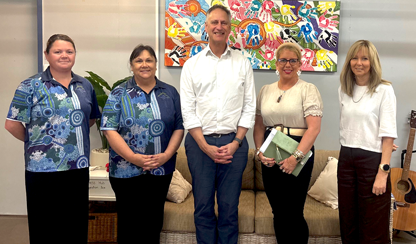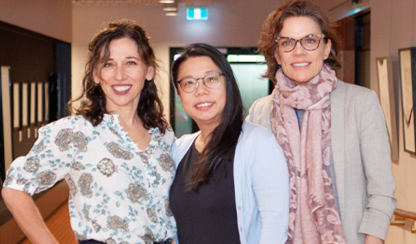02 December 2021
Institute news
Coming to the end of our 95th anniversary year, we asked some of our team to reflect on the special personal connection they have to their work at the Baker Institute. Since its establishment in 1926 by pharmacist and philanthropist Thomas Baker (whose family foundation is still one of our biggest supporters) the Baker Institute has been proud of the very personal nature of its mission: inspiring discoveries that help all Australians live healthier for longer.

Karlheinz Peter — Cardiologist and heart researcher
Throughout high school, I did quite well in science-based subjects, so I was always planning to pursue a research pathway. However, during my final year of high school, my father suffered a big heart attack which he fortunately survived but continued to have ongoing health difficulties. This experience was a turning point for me where I realised, I might be able to use science to help people. My father’s experience with cardiovascular disease made me very much aware of the limitations of the medications currently available, and the importance of the innovative research we do here at the Baker Institute. My father couldn’t be saved, he eventually died from cardiovascular disease because of limitations in treatment options with accompanying side effects. This personal experience combined with seeing many patients suffering from the consequences of heart disease, are my strong motivation to do research and ultimately find better options for diagnosis, prevention, and treatment of heart diseases.
Charles Cohen — PhD student
When I was six years old my mother passed away from a sudden cardiac arrest and we still don’t know the cause. On the same side of the family, a cousin of mine also passed from a mysterious cardiac event. This personal experience has driven my enthusiasm to learn as much as I can about how the heart works and what contributes to heart dysfunction in disease. My father is an endocrinologist and has been extremely influential in my life. This also means that I have been aware of diabetes and its consequences since I was young, and now we bounce around ideas off each other. My PhD project in cardiac cell biology has primarily focused on the diabetic heart, however I hope to extend this work to other forms of heart disease. It is critically important that we investigate the heart at the cellular and molecular level because these finer details require our attention. I have just submitted my thesis in memory of my mother, in the hope that I can further contribute to research in her honour.
Hannah Stevens — Hematologist and PhD student
My younger brother had a large pulmonary embolism when I was doing my physician training, he got admitted to hospital the day prior to my physician exams! He ended up in intensive care and it was terrifying for the whole family, particularly because he was a young, healthy man with no reason for this to happen. It made me want to understand the pathogenesis of venous blood clots and see if we can find a way to predict who will develop them. Now I’m happy that I can help people with bleeding and clotting disorders through both my clinical and my research work. My PhD focuses on evaluating markers that can used to predict acute and recurrent venous blood clots and I’m positive my research work has made me a better clinician.
Anna Tran — Marketing and Events Coordinator
I was diagnosed with type 1 diabetes a few years ago, and in that first year of diagnosis I responded with shock, denial, anger, and grief! But I was incredibly fortunate because I always had the support of my siblings, who all work in medicine. And I had a diabetes specialist team who gave me holistic and personalised care. Most importantly, they all encouraged me to seek out things in life that enabled me to live well. So, I became a diabetes nerd! And I tried my best to understand this disease. It’s a privilege to work at the Baker Institute because I get to learn and be inspired by our team of scientists, researchers, and health professionals every day. In my role I help connect people to resources that enable them to live well, whether it be learning about our work, getting to know our dedicated team, or being part of a healthy community.
Andre La Gerche — Cardiologist and heart researcher
I was greatly affected by the sudden and completely unexpected death of two close mentors and friends early in my career as a doctor. One was a family friend and high school teacher in his 40s, the other a physician in his 50s who I worked with during my medical internship. They both had a significant impact on my decision to become a doctor and I still have my mentor’s stethoscope that his family gave to me. Both were young, fit men with no prior history of heart disease, or health issues of any kind. Their families have never gotten answers about what happened and why. Now these questions are the focus of my research. The trauma on families, the seeming injustice and how it can be prevented. We still don’t have a good answer for that, but my team has started the first registry into sudden cardiac death in under 50s. We aim to better understand why the hearts of seemingly healthy young people stop working, so we can better prevent these tragedies.
Joanne McKeown — Philanthropy Manager
My grandfather died of a heart attack at the footy when he was 53 and my nana died in her sleep when she was 62. I’ve always known there’s a history of heart issues on my dad’s side of the family, but I’d never been really worried until my father was diagnosed with a faulty heart valve four years ago. It was a huge shock! After outlining the problem and how he would fix it, the surgeon said to my dad: “If your heart stops between now and the operation, I won’t be able to start it again”. That was the real wakeup call! But I’m so happy to say that the surgery was a success and dad still plays golf every week, walks every day, and now minds his great granddaughter once a week. Working at the Baker Institute I feel excited to be part of a team that can make a difference. My role supports the researchers and their science, which informs medical practise, so families like mine can have a more hopeful future.





